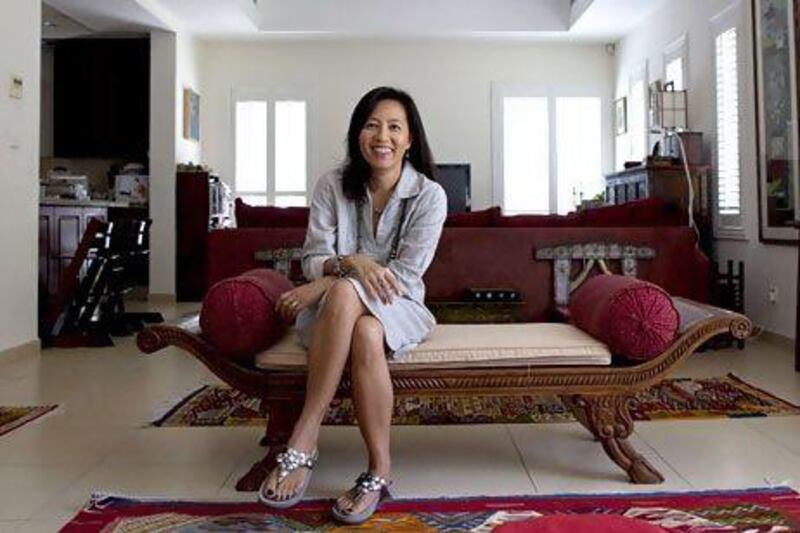Elizabeth Hannigan is not a bargain-hunter. A look around her Arabian Ranches villa in Dubai underlines her extensive travels and impeccable taste. However, the Australian is among a growing band of UAE residents drawn to the region's newest online incarnation - financial comparison sites.
The concept first appeared in the wake of the financial crisis when budding entrepreneurs saw an opportunity to cash in on the nation's hunger for a good deal.
Listing a smorgasbord of financial offerings from credit cards and personal loans to schools and insurance, the sites offer something not seen here before - a comprehensive guide to the personal finance market.
"The potential in the UAE market is clear due to the difficulty in obtaining financial product information and digital content generally," says Beth Thomas, the marketing manager for Compareit4me.com, which launched in August 2011.
"We have witnessed over 115 per cent growth in six months. It's vital people know exactly what they are getting before taking out financial products; feedback from our users indicates a comparison site solution is what they are looking for in the UAE."
As with most new concepts, there are varying degrees of research and development among the players in the comparison market with some more user-friendly than others.
"When people arrive here they don't know most of the banks and this gives an idea of what is out there," says Mrs Hannigan, who moved here from Hong Kong with her husband and two children eight years ago.
As someone who pays off her credit card every month, she can now search for credit card benefits among a vast selection that includes air miles, access to airport lounges and golf privileges. "Back home, you follow what your parents did. But here you are on your own and these are not interesting purchases so you don't want to spend long on research, you just want something you trust and know it's not a rip-off," adds Mrs Hannigan.
The most recent arrival to the comparison sphere is Nexus Insurance Brokers, which unveiled its insurance comparison portal nexuscompare.com in April. Users can compare car, medical, travel and home insurance and then purchase the policy of their choice from the quotes offered.
But the comparison concept is not only beneficial for the consumer, it also helps banks and insurance brokers market their products.
"Our approach helps participating insurance companies gain market share by giving discerning consumers exactly what they want without hiding behind complicated terms and conditions," says Mahmoud Nodjoumi, founder and chief executive at Nexus Group.
Nexus arrives at a time when many sites already offer a similar concept. Among them is Souqalmal.com.
Founded by Ambareen Musa, she and her business partner were employed in the financial services industry before spotting an opportunity. Souqalmal - Arabic for money market - launched in May last year. Today, it compares more than 1,000 products from loans to insurance, credit cards and schools, and describes itself as the region's leading comparison website . It has already expanded into Saudi Arabia and Kuwait.
Souqalmal.com follows tried and tested models from the West. Bankrate.com in the US has annual visits of over 150 million with a turnover in excess of Dh1.1 billion; the UK's Moneysupermarket.com has annual visits of 46 million generating Dh125m, so the potential for the UAE's comparison sites hardly needs stating. Yet Mrs Musa plays down this potential.
"Bankrate.com and Moneysupermarket.com are 15 years old and quoted on the stock exchange. The culture, stage of internet penetration, online buying and even the banking system is very different so it would be premature to even put a number on the potential for Souqalmal.com," she says.
The comparison concept may be new here, but sites are experiencing dramatic jumps in user numbers.
Rob John, founder of moneyshop.ae, which launched in August 2011, receives 5,000 unique visitors a month. "Seventy-five per cent of the visits are from new visitors and the remaining 25 per cent are return visitors. These numbers grow month on month and have doubled in the last three months," he says.
But with users able to compare for free, how do sites make money?
"The business model is similar to Google," says Preeti Harrison Bhambri, director of MoneyCamel.com, which launched in December 2011.
"The core of the website is product search, which is completely free for users, while the revenue comes from a mix of advertising and lead."
However, the publishing and media consultant Amine Rouhana, says any site relying on advertising spend should beware.
"Online, the ad spend is only 10 to 12 per cent of the advertising market. Print still dominates taking 60 per cent, TV at 20 per cent, radio at 7 per cent and cinema 3 per cent. If you don't have the traffic then you won't get advertising and to get the traffic you have to spend on marketing."
For now, the sites are simply happy with their growing visitor numbers.
"The aim is to have at least 10,000 unique monthly visitors by the end of 2013. Although the numbers may seem relatively small, the visit base is very specific in that they are consumers looking for a loan, credit card, bank account or savings account in the UAE - which is very appealing to advertisers," adds Mr John.







